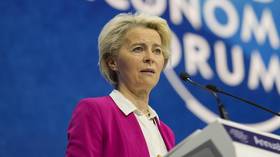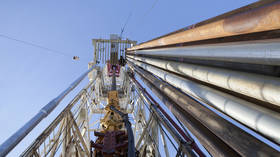EU president accuses Russia of energy ‘blackmail’

European Commission President Ursula von der Leyen on Tuesday accused Russia of “blackmailing” the EU with its oil and gas exports. However, the bloc is in the process of voluntarily cutting itself off from these energy resources, and Moscow has blamed global food shortages on Western sanctions.
Speaking at the World Economic Forum’s annual meeting in Davos, Switzerland, von der Leyen said the EU would “accelerate” its transition to green energy “because of Russia’s blackmailing us with fossil fuels.”
Yet hours before she spoke, German Economy Minister Robert Habeck announced that the EU’s 27 member states would “reach a breakthrough within days” to ban Russian oil imports, upon which many EU states depend. Germany, for example, relies on Russia for around a quarter of its imported oil, while the bloc as a whole sources 27% of its supply from Russia.
Von der Leyen has also promised to reduce the EU’s reliance on Russian gas by 66% this year and eliminate it entirely by 2027, as part of a green energy plan announced last week. At present, 40% of the EU’s gas comes from Russia.
Since the start of its military operation in Ukraine in February, and throughout waves of successive EU and US sanctions, Russia has continued to sell its oil and gas to the EU. Moscow has demanded, however, that importers buy its gas in rubles. More than half of Gazprom’s foreign clients have already opened ruble accounts with the Russian energy giant, according to Deputy Prime Minister Alexander Novak.
Von der Leyen also accused Russia of using “food exports as a form of blackmail,” by allegedly blocking grain shipments out of Ukraine and refusing to export its own supply.
However, Kremlin spokesman Dmitry Peskov said on Monday that the West’s economic sanctions are responsible for rising global food prices, and that Ukraine is free to export its crop through Poland. Peskov also accused Ukrainian naval forces of mining the Black Sea, making shipments “virtually impossible.”













